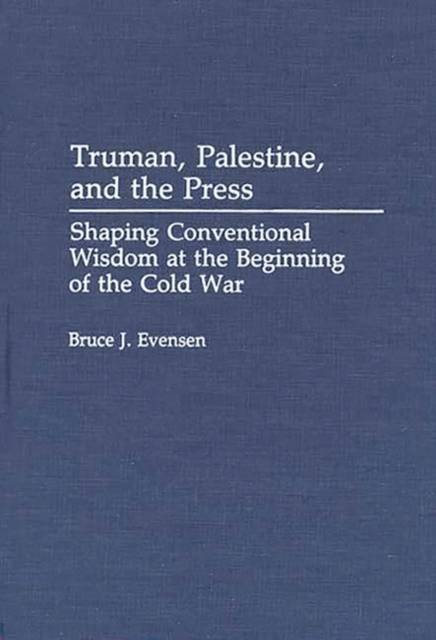
- Afhalen na 1 uur in een winkel met voorraad
- Gratis thuislevering in België vanaf € 30
- Ruim aanbod met 7 miljoen producten
- Afhalen na 1 uur in een winkel met voorraad
- Gratis thuislevering in België vanaf € 30
- Ruim aanbod met 7 miljoen producten
Zoeken
Truman, Palestine, and the Press
Shaping Conventional Wisdom at the Beginning of the Cold War
Bruce J Evensen
€ 161,45
+ 322 punten
Omschrijving
In this absorbing book, Bruce J. Evensen analyzes the role of the mass media, public opinion, and the Zionists in the evolution of America's Palestine policy during the Truman administration. Taking issue with recent revisionist historians who argue that Truman had little difficulty manipulating public opinion, Evensen claims that the press and an aroused public opinion successfully frustrated the President's course on Palestine and elicited his support of the United Nations' partition of Jewish and Arab states and Truman's early recognition of Israel.
Evensen emphasizes the development of a conventional wisdom that placed the Middle East at the center of U.S. strategic planning and saw limiting Soviet penetration as a primary goal. Within this context, he shows a divided Truman administration, which was uncertain how to act on the Jewish state. Reluctantly, the administration initially supported the UN's vote to partition the region; then, as Palestine erupted into violence, it attempted to abandon this decision. Interpreting the President's action as a gutless appeasement of the Arabs and an indication of his fear of the Soviets, the media, reflecting the public's Cold War fears, confronted the administration's policy in the Middle East and frustrated the President's effort to abandon the partition scheme. The media's role in reflecting and shaping competing visions of reality, which became the conventional wisdom of policy making, is a key part of this study.Specificaties
Betrokkenen
- Auteur(s):
- Uitgeverij:
Inhoud
- Aantal bladzijden:
- 248
- Taal:
- Engels
- Reeks:
Eigenschappen
- Productcode (EAN):
- 9780313277733
- Verschijningsdatum:
- 20/02/1992
- Uitvoering:
- Hardcover
- Formaat:
- Genaaid
- Afmetingen:
- 156 mm x 234 mm
- Gewicht:
- 535 g

Alleen bij Standaard Boekhandel
+ 322 punten op je klantenkaart van Standaard Boekhandel
Beoordelingen
We publiceren alleen reviews die voldoen aan de voorwaarden voor reviews. Bekijk onze voorwaarden voor reviews.











